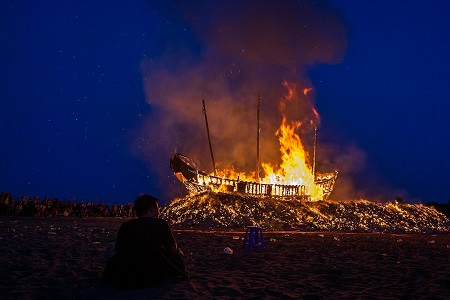Burn Boats
 Burn boats is another expression more common among the British. In America, we usually refer to burning bridges or burning our bridges behind us. The two expressions have the same meaning.
Burn boats is another expression more common among the British. In America, we usually refer to burning bridges or burning our bridges behind us. The two expressions have the same meaning.
Burn boats (or burn the ships) means to destroy all means of retreat.
We leave no way to return to our previous situation. According to U.S. Dictionary, this idiom comes from “the story of Hernán Cortés, who, upon arriving in Mexico in 1519, ordered his men to burn their boats, making it clear that there was no turning back.”
When we burn boats in our lives, our commitment forces us to go forward.
We can only move toward the goal or battle before us. As with Cortez and his men, our decision is both brave and risky.
- It is difficult or impossible to reverse.
- Yet, we strive harder to achieve our purpose.
The song, “Burn the Ships,” by for King and Country is based on this expression. Learn the reason for their song choice here.
Sometimes we must turn away from our past in order to follow the right road ahead.
Rather than look back, we pursue the good God offers before us.
“Forgetting what is behind and straining toward what is ahead, I press on toward the goal to win the prize for which God has called me heavenward in Christ Jesus” (Philippians 3:13-14 NIV).
Thanks to Jonna J. LeVan for the suggestion. Photo by Klub Boks on Pexels.
Do you have an expression you want explained or a thought about this one? If so, please comment below.
Subscribe to receive my weekly posts by email and receive a free copy of “Words of Hope for Days that Hurt.”
If you enjoyed this post, please share it with your friends.
8 thoughts on “Burn Boats”
I never heard this one before. Excellent explanation and application, Diana!
Tracy, I had heard “burn the ships” or “burn our bridges” but not “burn boats.” Jonna gave me a little background and the song. Those made the explanation easier.
I hadn’t heard this story about Cortez, Diana, so I’m glad to know it. Yes, at times we have no choice but to move forward and leave our past behind. It is risky, but having God with us makes it worth it.
Blessings!
Martha, the story certainly demonstrates commitment, doesn’t it? May we always follow God with that kind of commitment. Blessings.
I had not heard the expression “burn boats” previous. But I have burned some bridges in the past–sometimes with a positive outcome and others with not so good results. I enjoyed learning the origin of “burning boats.”
Katherine, I learned quite a bit as I wrote this post since I was not too familiar with the expression. We should both be a little better prepared to converse with any British friends. Have a lovely week!
I love this song. What a powerful video you found!
No retreating back, forward only!
What a beautiful message.
Burn. Ships.
Thank you so much for the expression and song suggestion, Jonna. You bless my life. Have a wonderful week!